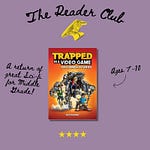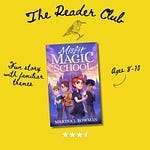Intro to Book
Hello Readers,
Today is a bit different. So far the books I’ve reviewed have been in the fantasy realm. Literally every single book I’ve done. There is the one episode where my friend Jennifer Jahn guest hosted a children’s book, but each of the episodes I’ve hosted have been fantasy. But today we’re delving into Sci-fi. Not really all that different in some aspects. Both are forms of fantasy but where they differ are the questions each genre explores. Fantasy might explore questions of morality, whereas sci-fi explores questions of possibility. Really large and vague topics for discussion, but go with me here. Fantasy might ask “what would happen if a kid became king?” Sci-fi would ask, “what would happen if technology advanced to the point of no longer needing governments?” “What does a warrior do after years of peace and a sudden change brings war to his homefront?” Or, “what would a robot do if it were dropped off in the middle of nowhere?” Which just so happens to be the question of the book we’re reviewing today.
Today I’m reviewing The Wild Robot by Peter Brown. Now, I picked up this book quite a while ago before I knew it was going to be a movie, but I only recently read it when I discovered it was coming out. Mostly because the trailers make the movie look awesome and my kids want to watch it. So, of course, I had to know what it was about. Being a sci-fi and asking such tantalizing questions as sci-fi does, this one intrigued me. What would a robot do if it were dropped off in the wild? The assumptions must be made that the robot would not be in its designed environment, of course, and would have to adapt. So how would it adapt? Well, this novel explores that question in very intriguing detail.
Summary
The story begins with a shipwreck leaving a shipment of robots on an island where one unit, Rozzum 7134 wakes up and becomes aware of its surroundings. The environment is harsh and not suited to a robot (it was shipwrecked and marooned on the island) and so seeks better, or more suitable living conditions for itself.
The results are disastrous, all creatures on the island fear it, running away or attacking it and so it learns continually to adapt to the island it is on. Not understanding if it was meant to be there or not, or how it ended up there, or where it was supposed to go, it just continues to exist on the island and adapt.
This may be the shortest summary I have given, but I don’t want to give any spoilers away.
Characters
Despite the short summary, there are a slew of characters in this story. However, for the sake of no spoilers, I will only tell of one.
Rozzum 7134, otherwise known as Roz, is the resident robot. Though, it is very foreign to the island and very unwelcome. From the beginning of her awareness, Roz must make sense of why she (I think of it as “she”) is on the island, to begin with. She doesn’t know. It is her journey to self-discovery.
She is a likable character, though a bit stoic. She is, which is rather odd for a robot if you think about it, curious. Now, this may be natural for a robot to understand its environment and adapt, but Roz seems special in this way, and it is this one trait that the book primarily explores. Which is why it is truly a sci-fi.
Analysis
So, I will say I enjoyed the book. But I often found myself chuckling (delightfully so) at the playful robotic language of the book. I’m not sure if Brown intended this or not, but I felt as if I were reading the diary of a robot. I’m not implying a robot wrote this, but the sentences were short and concise. Not dry or lacking in imagination, but still rather abrupt. It felt as if Roz were telling us the story. Many of the sentences were less than ten words long. Ideas that could’ve been stretched poetically into long sentence structures were cut short and made into concise sentences. Yet, again, not lacking in imagination. But this made the book very easy to read. Though it might be a bit long for the average 6 to 7-year-old, they could read it easily enough. I would put it at 8 years old for a comfortable and easy read making it a proper middle-grade novel.
Major Themes:
I think I’ve already covered this, but the major theme is the self-discovery of a robot. Which is an interesting idea to conceptualize. I imagine Charles Dickens inserting his voice at the beginning of A Christmas Carol when he says “Marley was dead as a doornail…this must be believed if any of the following events are true.” It must be believed that the robot can in some way become sentient. Brown doesn’t come out and say this in the book like Dickens, but still, it must be believed for the rest of the story to be enjoyable.
Writing Style:
Like I said earlier, this book reads a bit funny. Like a robot. Short sentences build upon each other with no poetic fluffing to fill them. This is not my usual taste in reading. I like a bit of marshmallow to fluff my reading. Some poetic license to sweeten the story. However, this did not deter me from reading the book. I just felt, the entire time, that I was reading a very young book for a very young audience. Younger than any book I’ve reviewed so far. However, I doubt many kids under 10 would even pick up on this writing style. It is not dry. It is quite lively and full of personality. Just appropriately written for an average 7-year-old reader.
Plot:
The plot is very simple, but there are some interesting things that happen in the book. Good thinker stories that certainly would poke rabbit holes of imagination into the reader’s thoughts. Philosophical and moral questions even, which Brown explores with the sentient robot. It’s like a survival book, an outdoorsman book, but the main character is a robot. It is quite easy for a young reader to follow, and the questions entertained me. I’m sure they could easily entertain most readers who look for books asking such questions.
Gospel Connections:
I’m not sure how I’m going to do this one today, to be frank with you all. The conversations are there to be had, I assure you, and they could be excellent. And there are no questionable points in the book. To put some of the themes vaguely enough, there is kindness that is seen in the book. There is the theme of sacrifice that is seen. There is caring, love, joy, and peace. Much of the book explores these themes through the eyes (or more appropriately, lens or cameras) of the robot.
There are so many situations that occur that the robot must explore, but again to speak anything in detail on this, I would be giving far too much away. Instead, here’s a list of questions you might ask as you read it, or as your child reads it.
What does the robot do that shows kindness?
Where does the robot see selflessness?
When something “bad” happens, what is the robot’s concern?
Do you think the robot knows the difference of right and wrong?
Can we see how this story reflects themes found in the Bible?
Is there anything in the book that reflects Jesus’ teachings?
Social Impact:
This is again a hard one. There are socially impacting elements to this story and nearly all of them would be spoilers. But they are great! This is the type of book I would suggest reading to you 6 to 10 year old. That way you could discuss these elements with them as you go through the book. But again, I won’t leave you totally hanging. Here’s some socially driven questions you can ask your child or ask yourself as you read:
What is in here that teaches us about friendship?
How does cooperation work in the story?
When trouble comes, who does Roz put first?
How does the story deal with loss? How can it help us deal with loss?
What is the story saying about the future?
Final Thoughts
I would give this book a 3.5 out of 5. For reference, my scale looks like this: 1 = No good, didn’t enjoy at all; 2 = Okay, but wouldn’t necessarily recommend it; 3 = Good book, would recommend, I enjoyed it; 4 = Great book, would definitely recommend, loved it; 5 = Excellent book, practically perfect in every way, ‘nuff said. It sits somewhere between I enjoyed it, and I loved it. There were parts that I loved, but the readability of it made me dislike it some. I don’t think this book would challenge my kids. In fact, I believe they could read it in a day with no problem. But I would still give it to them for the thought-provoking questions it asks, and the conversation we could have on it. But, as I said, I might take the time to read it to them and have discussions as we go through it. If you do so, let me know how it goes.
Until next time, have a good read.











